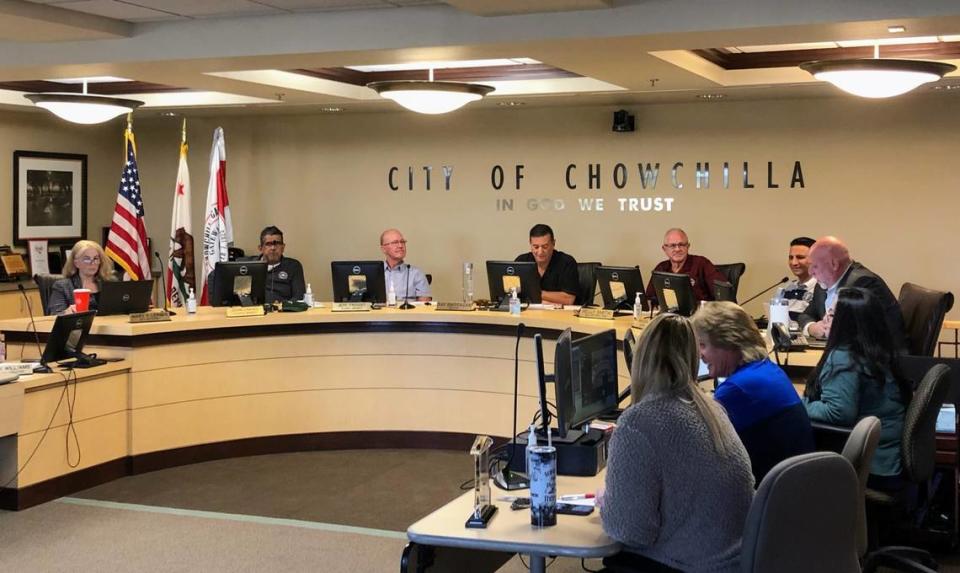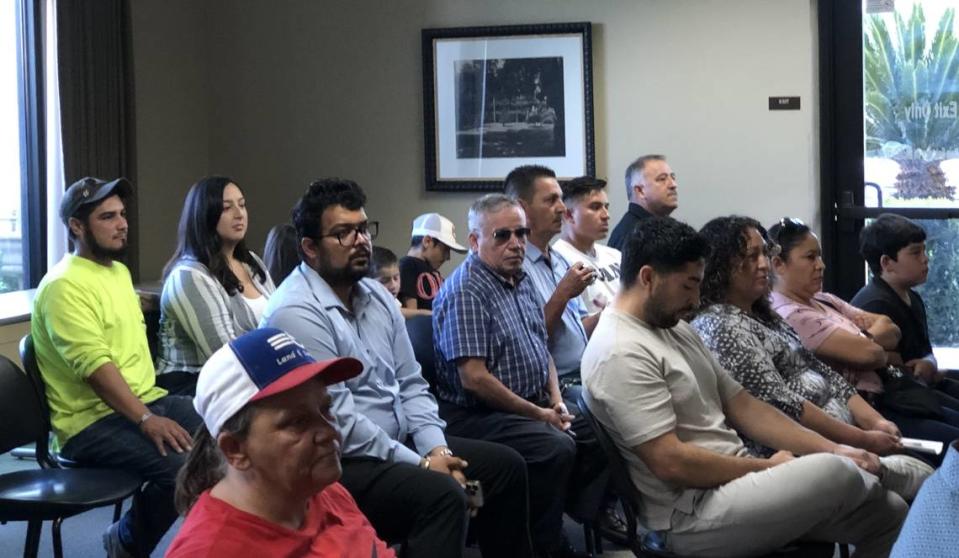‘We also want to be treated equally’: Chowchilla City Council to rehear hefty food truck fees
Chowchilla residents who own food trucks and say it’s near impossible to operate them in town called for the city to cancel a $100-a-day fee it passed in August, describing it as one that stifles entrepreneurship for Latinos and low income people.
Digna and Adonay Díaz took their Plátano, Pupusas Y Cafecito Salvadoran food trailer to Madera after finding out in August that a food truck permit would cost them $100 per day of operation – or $36,500 annually – in Chowchilla.
On Tuesday, Adonay Díaz presented to the City Council a petition with 514 signatures that requests the repeal of the new food truck fees and other “obstructions,” including the requirement for an administrative use permit that costs $550.
“All four individuals that we know that are being pushed out of the city by this fee are Latinas,” Adonay Díaz’s son, Josue, told the council. “This is a textbook example of institutional racism, and we will not stand for it in any way, shape or form.”
Mayor Ray Barragan Jr. previously said he wanted the food truck owners to make their voices heard to the council so it could consider their requests.
Food truck owners battle Chowchilla’s new $100-a-day fee, say it has ‘racial undertones’
“We don’t know what’s going on unless people come and speak up to us during council,” he told the Bee on Wednesday. “It was great that people showed up in support of food trucks.”
After hearing the Díaz family and Chowchilla food truck owner Catalina Mendoza speak, the council directed staff to bring the fee back for review at a later date. Barragan said there will be a public hearing on the matter when city staff are ready to present a report.
An exact date is not yet known, Barragan said Wednesday.

City Council to discuss fees more comprehensively
Barragan attributed the minimal council discussion when the new fee schedule passed Aug. 22 to there having been so few food trucks in Chowchilla in the past.
Community and Economic Development Director Mark Hamilton said during that meeting that the city was trying to make its fees “more current to today’s standards.”
Jacob Sandoval, California director of the League of United Latin American Citizens, called into Tuesday’s council meeting and noted that permits for food truck operators in nearby cities amount to less than $1,000 annually. The Díaz family paid $614 in the city of Madera.
Barragan told the Bee the council will likely compare its fees to those in surrounding cities and ask more questions when the issue is back on the agenda.
“More importantly, we’ve never really allowed food trucks in Chowchilla, so change is good for everybody if we need it,” he said.
La Abeja, a newsletter written for and by California Latinos
Sign up here to receive our weekly newsletter centered around Latino issues in California.
Pupusa, taco truck owners address council in Spanish
Digna Díaz told the council it’s been impossible to obtain a food truck license because of the city’s high costs and “unreachable regulations.”
“They are not imposed on other businesses,” she said in Spanish. “We also want to be treated equally to all others who seek business licenses in Chowchilla. We don’t want injustice or exclusion for this city’s Latino community.”
Mendoza, who owns Tacos El Guerrero, said she stopped working her trailer after being notified that she will be brought into compliance with the city’s new fee. Previously, Mendoza paid $242 for a permit, which she said was a “battle” to get approved for one location.
She doesn’t sell enough food to afford the $1,000 rent she pays at the location and the city’s new fee, Mendoza said.
“I’m here asking for you to help us,” she told the council in Spanish. “It’s not fair to those of us who are trying to succeed in this city.”
“We shouldn’t have to be your friends to participate in legal business activities,” Adonay Díaz said after Mendoza. “Mobile vendors should not ... have to beg you for an exemption from a fee you have imposed.”
Nitesh Kunwar, speaking on behalf of Masala Art Indian Cuisine, raised concerns that too many food trucks will begin to appear in the city. He questioned whether food truck operators will pay the same amount in taxes and fixed costs as brick-and-mortar restaurant owners.
Sandoval told the Bee on Wednesday that the new fees take away what is for many Latinos the first step in the restaurant business.
“A food truck owner can become a brick-and-mortar restaurant owner,” he said. “This (fee) impacts young Latinos especially.”
Like the food truck owners once did, Barragan said he grew up doing fieldwork. He added that he has created jobs for 1,700 Latinos nationwide as president of Golden Memorial Insurance, and reiterated that he wants to help Hispanics open businesses in Chowchilla.

Mayor’s vote a conflict of interest?
Josue Díaz said during his comment to the council that Barragan’s vote on the fees in August was a conflict of interest because he owns Sugar Ray’s BBQ in Chowchilla. He called it a vote to “increase fees on a competing business segment.”
“If council does not repeal the fee, a court of law can decide if that conflict nullifies the vote,” Josue Díaz said.
Barragan told the Bee that he does not believe his vote constitutes a conflict of interest.
“I would think that it would be in everyone’s best interest because I am so pro-business,” he said.
Barragan said he will follow the city attorney’s guidance on whether he should vote on the fee when it comes back to council.

